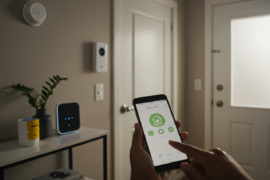This article may contain references to products or services from one or more of our advertisers or partners. We may receive compensation when you click on links to those products or services. Nonetheless, our opinions are our own.
The information presented in this article is accurate to the best of our knowledge at the time of publication. However, information is subject to change, and no guarantees are made about the continued accuracy or completeness of this content after its publication date.
- Key Highlights
- Introduction
- Understanding Different Schooling Options
- Public Schools and Their Community Role
- A Simple Guide to Picking the Right School Type
- Conclusion
- Frequently Asked Questions
- Recommended Reads
Key Highlights
- Choosing between homeschooling and private school is an important decision for parents.
- Both choices are ways to learn outside of regular public schools.
- The best choice depends on what each family needs, their values, and how the child learns best.
- Homeschooling lets you change the curriculum, while private schools provide organized classes.
- This article compares the costs of homeschooling to private school expenses to see which is more affordable.
Introduction
Choosing the right education for kids can be hard for parents. Public schools are the most common choice. However, homeschooling and private schools are getting more attention as families look for ways that fit their children’s needs. The choice often involves social and money issues. This article looks at the costs of homeschooling compared to private school fees. It aims to help parents find the most affordable choice.
Understanding Different Schooling Options
The choice of where to educate a child is critical and involves more than just schoolwork. Public schools, which get money from taxes, are open to everyone and are important for their communities. Private schools have specific programs, like teaching religion or advanced subjects, to meet some family needs.
Homeschooling gives parents full control over education. This means they can adapt learning to their child’s needs. A different option is charter schools. These schools get money from the government but run on their own. They often use creative teaching methods.
Public Schools and Their Community Role
Public schools are key to the U.S. education system. They give free education to all children, no matter their background. They are funded by taxes. They create spaces where students from different cultures and income levels can come together.
The public education system wants to provide students with key skills for college and jobs. Even though it has a set curriculum, it gives tools to meet different learning needs. Furthermore, public schools encourage students to be active in their communities. This practice helps students feel responsible and engaged with others.
The Appeal of Private Schools
Private schools operate on their own and mainly get money from tuition and donations. They usually have smaller classes, which allows teachers to give more personal attention. Many private schools focus on doing well in academics with advanced courses and special programs.
Some schools include religious teachings in their courses. Other schools concentrate on subjects like STEM or the arts. Private schools offer many activities outside of class. This approach helps students discover their interests and build different skills.
Exploring Different Education: Homeschooling and Charter Schools
For families who want more choices, homeschooling and charter schools are suitable options instead of regular schools.
Homeschooling lets parents create special learning plans based on how their child learns and what they like. Charter schools, however, get public money but feel like private schools. This advantage means they can use new teaching methods while still following state education rules.
What Sets Charter Schools Apart?
Charter schools are different from regular public schools because they have more freedom over their curriculum. They get public money but are managed independently. This arrangement allows them to focus on the specific needs of their students.
Some charter schools focus on STEM, which means science, technology, engineering, and math. Other schools focus on performing arts or personalized learning. They have to meet state education standards, but being independent lets them change their teaching methods.
Homeschooling: Tailored Education at Home
Homeschooling has become more popular as families want more say over their child’s education. Parents can make lesson plans to fit their child’s needs. They can change the pace and subjects to match their child’s strengths and interests.
Flexibility is a great benefit. It helps students to dive into subjects and practice with real learning experiences. Many families who homeschool add to their education by using online courses, community classes, and group activities. This approach makes sure their education is well-rounded.
A Simple Guide to Picking the Right School Type
Choosing the best education path depends on how a child learns, what the family values, and the choices they have. This guide shows important steps to help make a good decision.
Assessing Your Child’s Needs and Preferences
Every child has different strengths and challenges. Some do well in organized settings, while others feel better with open, self-directed learning.
Watching how your child likes to learn can show you what is best for them. Think about if they do better when exploring alone or working with others. Furthermore, look at any special learning needs and the support they have.
Step 1: Identify Your Educational Goals
Before you pick a school, think about what you want to learn. Do you care more about a strong educational base, a school with religious values, or programs that focus on certain skills?
Future goals matter too. They could be about preparing for college, vocational training, or a mix of both. Knowing your priorities helps you choose options that fit your family’s vision.
Step 2: Research and Gather Information
After you set your education goals, look into the school choices you have. Check online sites, read school rankings, and find out about the program details.
Getting involved with other parents, going to school open houses, and joining educational forums can provide you important information about the school’s culture, teaching styles, and activities outside of class.
Step 3: Visit Schools and Meet Educators
Whenever you can, visit schools to feel their environment yourself. Watch how classrooms work, how students and teachers interact, and what the school culture is like.
Homeschooling can be easier when you attend conferences and meet other families who homeschool. It helps you learn about different teaching methods and resources you can use.
Step 4: Consider Logistics and Practicalities
Beyond schoolwork, you should think about important things like where you live, how to get around, and your daily plans. Check if homeschooling fits into your family’s life and if you can dedicate the time and resources needed.
Furthermore, think about costs besides tuition. These include school supplies, activity fees, and uniforms. Knowing the total cost helps you make a better choice.
Comparing Academic Outcomes Across School Types
Success in school depends on several things. These include how involved parents are, family income, and the resources available. Studies about school results show different findings. It is important to look closely at specific schools and homeschooling options. This decision should be based on what each student needs, not just on general numbers.
Standardized Test Scores and College Admissions
Many parents look at schools based on test scores and how many students get into college. While these numbers give some clues, they do not show the whole picture of what students can achieve.
College admission rates show both the quality of schools and the makeup of students. They also show how well students get ready. Don’t just look at the numbers. Think about the teaching quality, how the curriculum fits with your beliefs, and the chances for students to grow.
Extracurricular Opportunities and Individual Growth
Education is more than just schoolwork. It involves growth as a person, building social skills, and joining in fun activities. Private schools usually provide various activities, like:
- Sports teams and athletic programs
- Performing arts clubs (like band, choir, and drama)
- Debate teams and school clubs
- Community projects
- Leadership programs
These activities allow students to work together, practice leading, and solve problems. They also give them the chance to explore what they like.
Conclusion
Choosing between homeschooling and private schooling needs careful thought. You should think about cost, school results, and what you like. It’s important to know what your child needs and how they learn. This understanding helps you make the best choice.
Both options have their benefits. Homeschooling gives a personalized education that fits the family’s needs. Private schools provide structured environments and special programs. Families can look at what they value, the costs, and their child’s learning goals. This information can help them choose the best way for their child to do well.
Frequently Asked Questions
How do charter schools differ from public schools?
Charter schools get money from the public but run on their own. This arrangement gives them more freedom to change their lessons. Many parents pick charter schools for their new teaching ways and special programs.
Yes, homeschooling gives many chances for kids to socialize. Homeschooled children can join community groups, sports teams, co-ops, volunteer work, and field trips. These activities help them build their social skills.
What are the advantages of private schools compared to public schools?
Private schools usually have smaller classes. This layout allows teachers to give more attention to each student. Many families choose private schools because they want religious education or special programs. These can include advanced placement classes and programs that focus on the arts.

Reviewed and edited by Albert Fang.
See a typo or want to suggest an edit/revision to the content? Use the contact us form to provide feedback.
At FangWallet, we value editorial integrity and open collaboration in curating quality content for readers to enjoy. Much appreciated for the assist.
Did you like our article and find it insightful? We encourage sharing the article link with family and friends to benefit as well - better yet, sharing on social media. Thank you for the support! 🍉
Article Title: Homeschooling Costs vs. Private School: Which Is More Affordable?
https://fangwallet.com/2025/03/11/homeschooling-costs-vs-private-school/The FangWallet Promise
FangWallet is an editorially independent resource - founded on breaking down challenging financial concepts for anyone to understand since 2014. While we adhere to editorial integrity, note that this post may contain references to products from our partners.
The FangWallet promise is always to have your best interest in mind and be transparent and honest about the financial picture.
Become an Insider

Subscribe to get a free daily budget planner printable to help get your money on track!
Make passive money the right way. No spam.
Editorial Disclaimer: The editorial content on this page is not provided by any of the companies mentioned. The opinions expressed here are the author's alone.
The content of this website is for informational purposes only and does not represent investment advice, or an offer or solicitation to buy or sell any security, investment, or product. Investors are encouraged to do their own due diligence, and, if necessary, consult professional advising before making any investment decisions. Investing involves a high degree of risk, and financial losses may occur including the potential loss of principal.
Source Citation References:
+ Inspo
There are no additional citations or references to note for this article at this time.












































